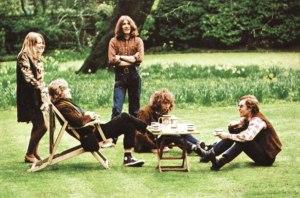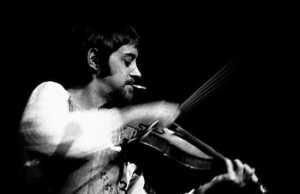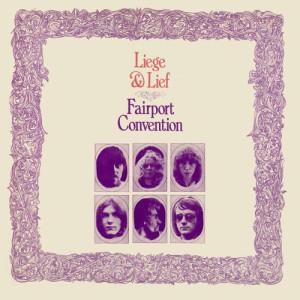This article is actually the first chapter of an unwritten book, so it may feel introductory rather than informative. A few years ago, a well-known music book imprint put a call out for submissions. The proposal requirements were very, very demanding and specific, but I followed them all, even writing and polishing the first chapter as requested.
Surprise, surprise, I never heard back from them. I’ll let you be the judge of whether you’d want to read more from me about this topic, based on the following! I surely would have enjoyed telling you the whole story, but at least I have this bit for you.
ENGLAND 1969
It’s late September 1969, a Wednesday night in the heart of the largest, most modern city in the United Kingdom, which bustles and throbs twenty-four hours a day. All over town, but particularly in the underground clubs, new sounds are explored and musical genres are developed, minds are blown, tabs are dropped. The bleak trappings of post-war Britain are gleefully being discarded by a utopian youth culture that generally doesn’t give a damn about the sacrifices of the older generations plagued by memories of wartime sorrow. It’s time to throw off the gray coat of austerity and usher in a new age spectrum of big, compassionate ideas. Peace, love and brotherhood! The same changes are occurring in New York, San Francisco, Berlin, Paris. Within a few short years, youth culture has become unrecognizable to those who came of age in the late fifties and early sixties, and the possibilities for further mind expansion and human betterment seem endless.
Music is the driving force and pulse of this movement, providing the inspirational soundtrack to the new world to come, fusing strange electronic sounds and technological developments with a disregard for conventional song structure, length and stilted, insincere romantic sentiments. Music from other genres and other cultures is being grafted onto rock’s electric heart, with euphoric results. Bands with far-out names like Pink Floyd, the Soft Machine, King Crimson and Tyrannosaurus Rex rule the London underground scene, and no one seems to bat an eyelash at an album title like My People Were Fair and Had Sky in Their Hair… But Now They’re Content to Wear Stars on Their Brows.
Though a back-to-the-land rustic musical movement has begun, led by the down-home, resolutely backdated authenticity of the four-fifths Canadian group The Band and further popularized through its adoption by Bob Dylan and The Beatles (whose White Album is quite different to the outrageous kaleidoscope of Sgt. Pepper’s Lonely Hearts Club Band released a year before), on the whole the hip kids are heavily into the zoned-out sounds of the psychedelic age.
Traditional folksongs, which had found some favor at the idealistic end of youth culture in the early sixties, are now well beyond passé, the musical territory of uncool dads with eccentric tastes, rural granddads with long memories going back to the Great War, and ardent, angry socialist trade unionists. These songs are fusty, dusty holdovers from duller days, full of irrelevant lyrics about rural life, strange archaic words and turns of phrase, clunky, un-funky melodies and rhythms — definitely something no one would want to trip to.
Even Ray Davies, that razor-sharp documentarian of the minutiae of an average life, doesn’t seem quite sure whether to poke fun at the village green and the bucolic panorama of commons, hayfields and country lanes, or to celebrate the nostalgia for a quieter, more ordered time that would never return for Britain’s people.
On the rock scene, sounds are getting even crazier with the introduction of the mighty primitive emulator, the mellotron, and synthesizers that have opened up a whole new universe of sonic possibilities — who’d want to listen to a nasty old fiddle sawing away on some jig?
*
Despite the vast gulf that yawns between button-down, scholarly folkies and the zany new acolytes of psychedelia, folk music is evolving. Acoustic guitarists like Bert Jansch, Davey Graham and John Renbourn have been expanding the limits of their instrument for years, fusing jazz and blues with traditional English tunes, early music and Middle Eastern music. Renbourn and Jansch’s band, The Pentangle, has a crack jazz rhythm section, including legendary double bassist Danny Thompson and Terry Cox, the drummer on Bowie’s “Space Oddity”, and almost (almost) sounds like a rock band at times. They play some traditional songs too, elegantly jazzed-up, and have even neared the top of the pop charts.
The Incredible String Band’s Mike Heron and Robin Williamson are the cosmic musical pied pipers of the psychedelic scene, playing dozens of instruments in myriad global styles (including Celtic) and releasing impenetrable albums with titles like The 5000 Spirits or the Layers of the Onion. But underneath all that weirdness you’ll find two committed folkies, as their future careers will demonstrate.
And in London, a band named Fairport Convention has slowly been evolving from a run-of-the-mill West Coast-style Jefferson Airplane clone into a rootsier folk-rock band that plays far more Dylan covers than is seemly. Just starting to waken to their talents, the very young members are fumbling toward greatness.
Twenty-year-old guitarist Richard Thompson is already a prodigy, spinning quicksilver, perfectly phrased solos on songs like “It’s Alright Ma, It’s Only Witchcraft” on Fairport’s debut (recorded when he was eighteen!). Slowly but surely his songs are starting to gain notice (Thompson will one day be lauded as one of rock’s greatest songwriters), and listening today, a song like “Genesis Hall” is chillingly good. Not bad for a kid just out of his teens.
Vocalist and songwriter Sandy Denny, a veteran folkie converted to a rock singer, is already well-known and renowned for her large-lunged prowess, and she’s enjoying her more glamorous time on the cool rock scene after slogging it out in the folk clubs.
Easygoing rhythm guitarist Simon Nicol is the sonic rock of the band, always dependable and agreeable, a reassuring presence on stage and on record. No one could predict that twenty years later, Nicol will be lone holdover from the early days still treading the boards as a member of Fairport, keeping the music alive and presenting it to a new generation of appreciative fans (including this very writer!).
Intellectual, serious-minded and always forward-thinking, bassist Ashley Hutchings is the de facto bandleader, shaping the group’s sound, always paying attention to what’s happening in the musi

On their third album, Unhalfbricking, Fairport Convention had recorded a long, ragged rendition of a traditional song, “A Sailor’s Life”, sung by Denny and accompanied by guest fiddler Dave Swarbrick, a giant of the folk scene. This recording is a true landmark, the first time that rock and folk truly collided, and it’s an interesting listen indeed, Thompson and Swarbrick dueling on guitar and violin, not taking turns soloing but competing simultaneously in trying to tear the lid off the atmosphere. Drummer Martin Lamble, who tragically would not see the day when this sound was fully realized, thumps his way tentatively through the track, seeming unsure of what rhythm is suitable for this kind of music (I’m sure he’d have figured it out eventually). Though uneven and sloppy, the recording is nonetheless an exciting success that still sounds fresh and vital to this day. It’s the sound of a group stumbling upon something new and not knowing quite what to do with what they’ve discovered — puppies standing up and howling for the first time.
However, the song is an oddity on an album that largely sticks with the band’s Byrds-y, Dylan-centric template (there are three Dylan covers on this album of eight songs, though one is from the as-yet unreleased Basement Tapes).
Unhalfbricking was released in July 1969. By the end of that same year, everything had changed for Fairport, and for the musical future. Typical of that era and amazingly to those of us who grew up much later in less exciting artistic times, so much change and development was packed into what now seems like a heartbeat. Lives were lost or forever changed in a tragic instant. Healing and renewal meant taking new paths, and the members of Fairport Convention walked bravely down that new road. For a time the musical world would take notice, and the echoes of this courageous choice ring on to this day.
On September 24, 1969, three months before the release of Liege and Lief, Fairport Convention took to the stage at the Royal Festival Hall with support from fellow Witchseason management acts John and Beverly Martyn and Nick Drake (yes, that Nick). The room was packed, anticipating a celebration of the band’s resuscitation and triumphant return. Some had probably been tipped off about what to expect from the music on this night: a new sound for a new band with a new decade on the way. But few could have predicted the magic that would follow.
*
Between 1939 and 1943, a writer named Flora Thompson (1876–1947) published three books, later gathered together in one volume as Lark Rise to Candleford. (Ashley Hutchings’ Albion Band provided the music for a stage adaption of these books in 1979 and released an accompanying album.)
These unprepossessing but charming semi-autobiographical volumes related the story of Thompson’s childhood in Oxfordshire at the turn of the twentieth century. Thompson had grasped the fact that she was a member of one of the last generations of Britons to experience a truly rural life in a small, tight-knit agrarian community, largely unconnected the problems of the outside world, and her aim in writing the books was to preserve a record of what it was like to live that way. These gentle books are an action movie fan’s worst nightmare, a catalog of everyday events in a slowly changing world, farming, bonds and relationships, the joys and tragedies of ordinary life. They are now classics, an important link to a lost past and a reminder of how shockingly fast the Western world has gone from horse-drawn ploughs to space tourism.
Some educated back-to-the-land hippies were drawn to these tales of a simpler time before pollution, before world wars and a global economy — or a least a time when the average person was blissfully ignorant of such things. It was a natural extension of the hippies’ rejection of a world that seemed to have gone very wrong.

On the back of The Albion Band’s Battle of the Field album sleeve, an anachronistically dressed Hutchings, instead of posing with his guitar onstage or in an alley, is shown gardening, which perfectly sums up the folk-rock aesthetic. This was not folk co-opted into the service of rock, it was the entirely the other way around. It was a crusade to use the trappings of rock to draw in new listeners and subtly coerce them into a greater understanding and pride in Britain’s indigenous culture.
Why am I telling you this? Well, just as scratchy field recordings of ancient Norfolk farm laborers singing the old, almost-lost songs and books such as Flora Thompson’s were massive inspirations to the likes of Ashley Hutchings, the music of Fairport Convention, The Albion Band, Steeleye Span, Richard Thompson, Sandy Denny, Horslips and many other acts was a similar revelation to the likes of me in 1990, during my nascent exploratory days as a music fan.
Growing up the child of two British parents in a prototypical example of North American suburban sprawl, a very quiet, shy, studious teen who didn’t quite fit in, I was naturally drawn to music well beyond the fringes of what was popular with my demographic. Later, of course, as a mature adult, I was able to appreciate the value of eighties AOR, (some) nineties alternative, heavy metal and electronic music. As a grown-up, my evaluation of music would be based on quality alone, not how it related to my station in the restrictive confines of high school culture. But at that time I needed validation for what set me apart, that feeling of always being the other.
The idealistic, dawn-hued music of whimsical British psychedelia drew me in first, albums by The Moody Blues, King Crimson, Genesis, Floyd et al. But one day I came across a batch of my parents’ old LPs that I had forgotten about. There were several by a group named Steeleye Span, really different and strange albums that combined aggressive rock sounds with medieval chanting and ribald lyrics about farm boys and girls literally rolling in the hay. It was so removed from the modern suburban reality in which I lived that I was totally drawn in. Soon my voracious new appetite for this music led me to the progenitors of the genre itself, Fairport Convention, and the album I am discussing here.
Just as a longing for simpler, gentler times provided meaning in the lives of idealistic young people facing a post-Altamont, labor strife-ridden, petroleum-crisis world in the shadows of Vietnam and the Cold War, discovering the rich history and cultural archetypes from my own background through this hybrid of modern rock and ancient folklore changed my life indelibly. And I’m not alone in this, since the cult audience for British folk-rock, comprised not just of aging hippies but idealistic young fans and musicians as well, remains large and strong.
We may owe the very survival of British traditional musical culture to a small group of dedicated, crusading musicians.
And it all started, all of it, in 1969 London with Liege and Lief.
LINK: Official YouTube album stream.
…also…listen to the author’s own version of “Reynardine”, which Fairport Convention recorded on “Liege and Lief”.

